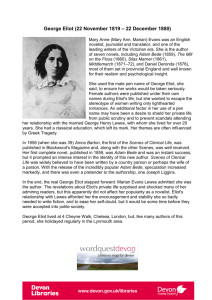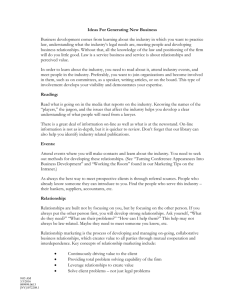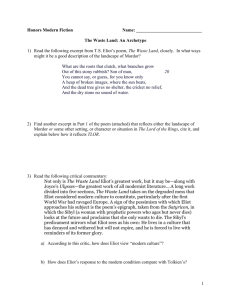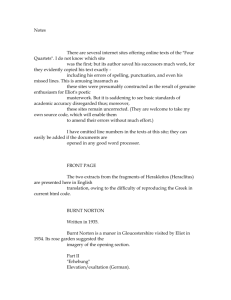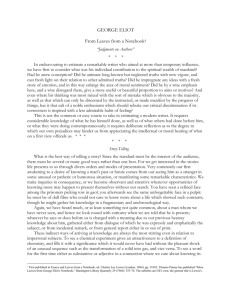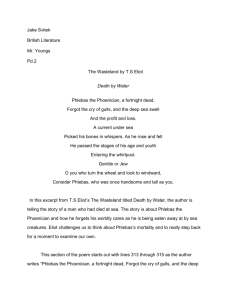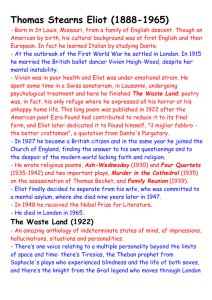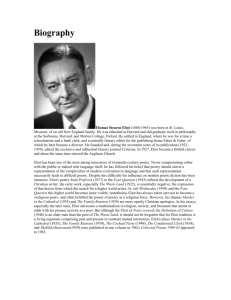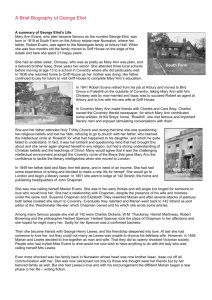BROTHER AND SISTER: NEW GEORGE ELIOT LETTERS
advertisement
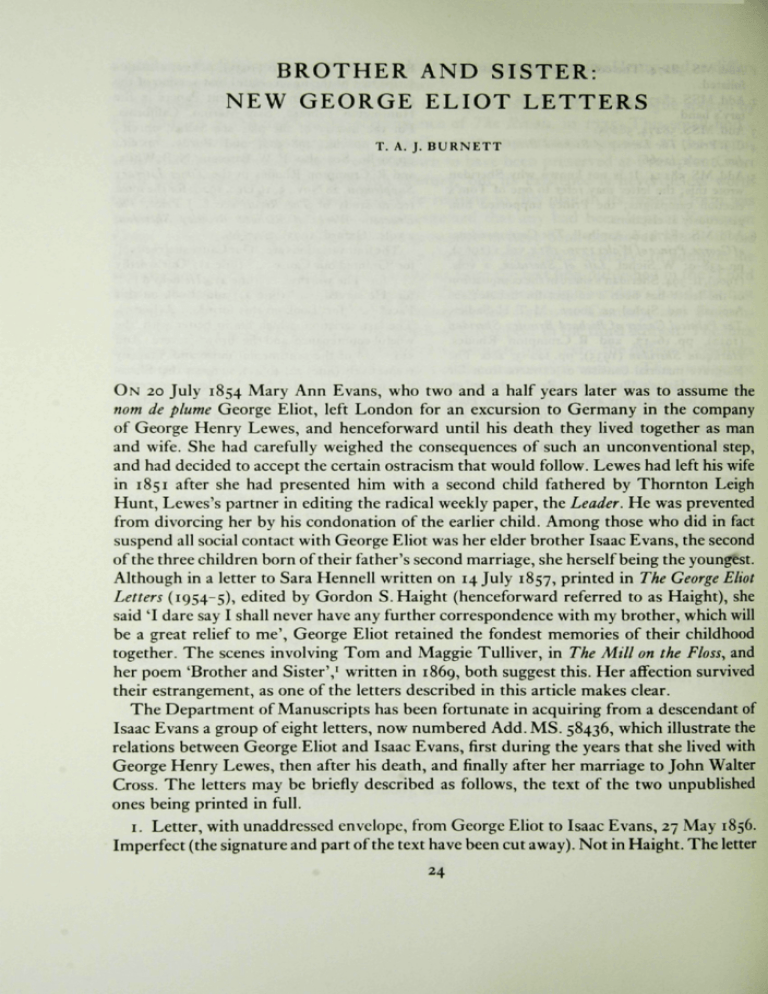
BROTHER AND SISTER: NEW GEORGE ELIOT LETTERS T. A. J. BURNETT O N 20 July 1854 Mary Ann Evans, who two and a half years later was to assume the nom de plume George Eliot, left London for an excursion to Germany in the company of George Henry Lewes, and henceforward until his death they lived together as man and wife. She had carefully weighed the consequences of such an unconventional step, and had decided to accept the certain ostracism that would follow. Lewes had left his wife in 1851 after she had presented him with a second child fathered by Thornton Leigh Hunt, Lewes's partner in editing the radical weekly paper, the Leader. He was prevented from divorcing her by his condonation of the earlier child. Among those who did in fact suspend all social contact with George Eliot was her elder brother Isaac Evans, the second of the three children born of their father's second marriage, she herself being the youngest. Although in a letter to Sara Hennell written on 14 July 1857, printed in The George Eliot Letters (1954-5), edited by Gordon S.Haight (henceforward referred to as Haight), she said 'I dare say I shall never have any further correspondence with my brother, which will be a great relief to me', George Eliot retained the fondest memories of their childhood together. The scenes involving Tom and Maggie Tulliver, in The Mill on the Floss, and her poem 'Brother and Sister',' written in 1869, both suggest this. Her affection survived their estrangement, as one of the letters described in this article makes clear. The Department of Manuscripts has been fortunate in acquiring from a descendant of Isaac Evans a group of eight letters, now numbered Add. MS. 58436, which illustrate the relations between George Eliot and Isaac Evans, first during the years that she hved with George Henry Lewes, then after his death, and finally after her marriage to John Walter Cross. The letters may be briefly described as follows, the text of the two unpublished ones being printed in full. I. Letter, with unaddressed envelope, from George Eliot to Isaac Evans, 27 May 1856. Imperfect (the signature and part of the text have been cut away). Not in Haight. The letter 24 is interesting as showing how George Eliot handled a difficult situation. Although she went away with Lewes in 1854, it was not until 26 May 1857 that she wrote to tell Isaac Evans of the change in her circumstances. Ilfracombe May 27. 56. My dear Brother When you send me the cheque for my half year's interest, will you be so good as to deduct £5, and give it to Chrissey^ towards helping to pay Emily's school bill, as that will save the risk of sending a £5 note by post. It would he very good news to hear that an opportunity had occurred of placing out my money more advantageously. I am rejoiced to learn from Chrissey that you are once more quite strong again. You must enjoy health doubly after suffering so long from the effects of your sad illness. I hope this wet May is good for the grass crops, for it is anything but exhilarating to us human plants. [Lacuna] When you send me the cheque, please to address it to Mr. Chapm[an]'s3 [K^]ing William SJ Strand where you may always address to me, as a letter is then sure to [Lacuna] 2. Letter from G.H.Lewes to the Revd.James R.Quirk, 20 August 1859. Copy in another hand. Printed in Haight, in. 135. This is the only letter in the group which does not concern George Eliot's relations with her brother, but rather an affair which caused her much annoyance in 1859, to wit the claim by one Joseph Liggins that he was George Eliot, the author of Scenes of Clerical Life and Adam Bede. Quirk was one of Liggins's most ardent supporters. 3. Letter, with envelope, from George Eliot to Mrs. William Griffiths, 9 May 1874. Printed in Haight, VL45-6. On 15 April 1874 Isaac Evans's eldest daughter Edith, the wife of the Revd. William Griffiths, was bold enough to visit George Eliot and G. H. Lewes at their house. The Priory, 21 North Bank, Regent's Park. This letter was written to thank for the gift of some photographs of Griff House, George Eliot's childhood home, a farm which her brother Isaac took over from his father. 4. Letter, with envelope, from George Eliot to Mrs. Isaac Evans, 20 February 1879. Printed in Haight, vn. 105. Isaac's wife Sarah had written to George Eliot a letter of condolence on the death of G. H. Lewes, and in this letter George Eliot expresses her gratitude and asks for her love to be given to her brother. 5. Letter, with envelope, from Messrs. Holbeche and Addenbrooke, Solicitors, to Isaac Evans, 7 May 1880. Not in Haight. The letter informs Isaac Evans that Holbeche and Addenbrooke have received a letter from Messrs. Duncan Warren and Gardner, Solicitors, *stating that they have been requested by Mrs. Mary Ann Evans Lewes to inform [them] that she was yesterday married to Mr. John Walter Cross of 38 Cornhill'. Vincent Holbeche of Holbeche and Addenbrooke was an executor of George Eliot's father's estate, and one of the co-trustees of her inheritance. It was through him that in June 1857 Isaac Evans had conveyed his displeasure to George Eliot at her 'not having previously made some communication to him as to [her] intention and prospects' when she wrote to inform him that she had changed her name and had 'someone to take care of [her] in the world', and to request him to pay her income into G. H. Lewes's account. 25 6. Letter from Isaac Evans to George Eliot, congratulating her on her marriage; 17 May 1880. Autograph copy. Printed in Haight, vii. 280, from the letter sent to George Eliot. The text of the two versions differs slightly, but not in any significant respect. 7. Letter, with envelope, from George Eliot to Isaac Evans, 26 May 1880. Printed in Haight, VII. 287. In her letter George Eliot replies to her brother's somewhat formal expression of congratulations by assuring him that their 'long silence has never broken the affection for you which began when we were little ones'. 8. Letter from John Walter Cross to Isaac Evans, 22 December 1880. Not in Haight. This letter would appear to be the first which Cross wrote conveying the news of George Ehot's death. It was written the same evening as the death occurred, as was his letter to Mrs. Edward Burne-Jones, but is longer than the letter to her, and goes into much greater medical detail. 4, Cheyne Walk, Chelsea, S.W. 22 Decf 1880 My dear Mr Evans, I scarcely know how to write and tell you that your noble sister and my wife died this night a little before 10 o'clock. I can scarcely realize yet that the crown of my life is gone. It has all been so very sudden. She was very ill this summer with a renal complaint of some standing but had quite recovered and we had just got into our new house here. On Friday last she went with me to St. George's Hall, Langham Place to see the Agamemnon acted: on Saturday we were at the Popular Concert* where I think she must have caught a chill for on Sunday evening she complained of a little sore throat and on Monday morning her throat being rather worse I went up for Dr Andrew Clark who has been her chief medical attendant for some years. He was unable to come to see her that day but gave me a letter to a friend and old pupil of his M!" W. G. Mackenzie who lives near here. Mr Mackenzie came on Monday afternoon and again in the evening but thought there was nothing worse than a violent affection of the larynx causing great difficulty in swallowing. She had a wretched night on Monday but on Tuesday morning the pulse was down to 80 @ [sic] 90 and temperature to 99. Mr Mackenzie came to see her twice on Tuesday and was not at all anxious about her state. When he came again on Wednesday (this) morning he found a great change for the worse - the pulse having got much quicker and the breathing disturbed. She was also suffering from great pain over the right kidney. He came back at 2 and found her worse again and when Df Andrew Clark arrived at 6 o'clock he at once declared there was little or no hope and at 10 o'clock she passed away without any pain - the cold had travelled down to the pericardium and complete loss of power of the heart supervened. I cannot write anything more tonight. I do not at all realize yet what has happened. It has all been so frightfully sudden. We have only been married a little over 7 months and one of the most gratifying collateral incidents of our marriage was that it broke the long silence that had existed between you and your sister. I will write you again when a day has been fixed for the funeral. I am quite dazed tonight but I feel that you should be written to first of all. The Brother 'who leaned soft cheeks together'^ with her in the old old days. In great woe, Yours very truly, J.W. Cross. 26 6x4. . /U dr • ^A,,*.*—iTT* w_ Evans concerning the death of George Eliot, Conclusion of the letter fron, J. W. Cross to 22 December i88o. Add. MS. 58430 1 Printed in The Legend ofjubal and Other Poems 4 The tragedy by Aeschylus was performed in Greek (1874), pp. 207-19. The MS.of the poem, now by a cast of undergraduates from Oxford. The Add. MS. 34038, tols. 80-90, is dated 31 July Popular Concerts were performed every Saturday 1869. in St. James's Hall. The Cross's had taken seats 2 Christiana, George Eliot's and Isaac Evans's elder for the season. sister, the first of their father's children by his 5 The second line of George Eliot*s poem Two second wife. Christiana had been widowed in Lovers' reads *They leaned soft cheeks together 1852. Emily was her oldest surviving child. Isaac there'. Perhaps Cross incorrectly remembered the Pearson was a co-trustee of the property left by line as coming in 'Brother and Sister', which would George Eliot's father, from which she received have been a more appropriate work from which about JC^OO ^ year. to quote. Both poems were printed in The Legend ofjubal and Other Poems (1874), 'Two Lovers' 3 John Chapman, publisher and proprietor of the on pp. 232-4. Westminster Review., of which George Eliot was co-editor in 1852-3. His office was in King William Street. 28
